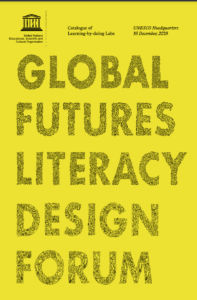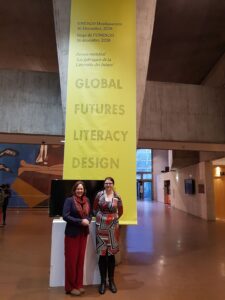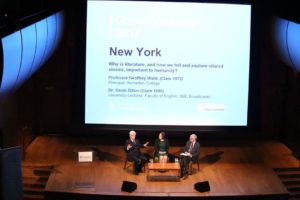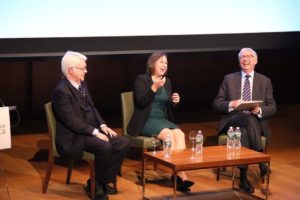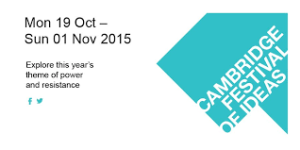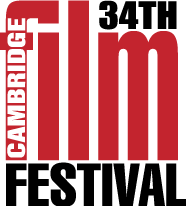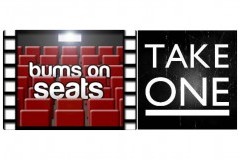One of my pre-pandemic, end of the academic year, June treats had become a trip down to London to take part in, and absorb the atmosphere and events at, the annual CogX Festival. It’s a rare event where academics, policymakers, technologists, industry people and many more come together to share knowledge around all things AI. As part of a series of public events for the Andrew W. Mellon Sawyer Seminar – Histories of AI: A Genealogy of Power – myself, co-organiser Richard Staley, and our postdoctoral research associate Jonnie Penn took part in 2021’s hybrid CogX Festival. We talked about what we’ve been doing on the Seminar for the past year, about some of the themes that have guided our discussions, and about AI and climate change. I spoke about AI and stories, drawing off the many things I’ve learnt over the course of the Seminar, thinking that has gone into and come out of the new book, Storylistening: Narrative Evidence and Public Reasoning, and research that’s informing my plans for the next book (I think!), on the intersections of AI research and literature in the mid-twentieth century.
Category Archives: Event
UNESCO Global Futures Literacy Design Forum, Paris, December 2019
I’ve just returned from a brilliant experience at the UNESCO Global Futures Literacy Design Forum in Paris. Two days of mind-opening workshops and discussions showcasing the diversity of activities globally that engage with human anticipatory systems and practices. I was involved in delivering two ‘labs’, along with my wonderful postdoctoral research assistant, Olivia Belton, pictured here alongside me. Olivia curated and led a lab developed out of our research project using a collaborative storytelling game to determine anticipatory assumptions about autonomous flight. Olivia led participants through the game she developed on the project, facilitating them to imagine near-future implementations of artificial intelligence. I curated a lab derived from the research for my work-in-progress book with Claire Craig on Storylistening. Whereas futures literacy activities often generate futures, and thereby reveal anticipatory assumptions, through collective storytelling (or other forms of collective imagining), the storylistening lab demonstrated the value to be gained from collective storylistening – that is the activity of listening to and analysing a pre-existing story. Participants worked with Ursula Le Guin’s rich short story ‘The Ones Who Walk Away from Omelas’ to think together about the questions the story raises around forms of governance, the morality of economic models, justifications of utilitarianism and the imaginative (in)ability to countenance alternatives to the status quo. I wrapped up the final day with an evening walk across Paris from the UNESCO site to Gare du Nord, along streets bedecked with Christmas lights and decorations, listening to Christmas music and enjoying the vibrancy of a city which has long been a favourite of mine.
AI Narratives at the Global Governance of AI Roundtable, World Government Summit, Dubai
This month I experienced a new country and a new  environment as I took our AI Narratives research to Dubai for the World Government Summit. I had the privilege to chair a session on underrepresented narratives at the Global Governance of AI Roundtable, hosted at the WGS. We discussed what kind of narratives dominate around AI, who is telling them, whose voices aren’t being heard and, most importantly given the purposes of the event, developed five policy recommendations in order to redress some of the inequities we’d identified. After the GGAR, I experienced the rest of the WGS, primarily attending sessions on either AI, or on women and leadership. The latter were particularly inspiring, from hearing Helen Clark (former Prime Minister of New Zealand) talk about her experiences of national leadership, to listening to Sarah Al Amiri (the UAE’s Minister of State for Advanced Sciences) share her story of scientific endeavour and leadership. It certainly did not feel natural being a humanities academic in such a policy-focused and political environment, but I was not the only one there and we all shared a common belief in the increasing importance of the presence of humanities scholars in these kinds of spaces. The benefits are reciprocal: we bring knowledge and skills that others present do not; but we also learn from interacting outside of our comfortable environments – it is challenging to one’s sense of established norms and values, but sometimes we need these to be challenged in order to reaffirm, or adjust them, in the context of an ever-changing world.
environment as I took our AI Narratives research to Dubai for the World Government Summit. I had the privilege to chair a session on underrepresented narratives at the Global Governance of AI Roundtable, hosted at the WGS. We discussed what kind of narratives dominate around AI, who is telling them, whose voices aren’t being heard and, most importantly given the purposes of the event, developed five policy recommendations in order to redress some of the inequities we’d identified. After the GGAR, I experienced the rest of the WGS, primarily attending sessions on either AI, or on women and leadership. The latter were particularly inspiring, from hearing Helen Clark (former Prime Minister of New Zealand) talk about her experiences of national leadership, to listening to Sarah Al Amiri (the UAE’s Minister of State for Advanced Sciences) share her story of scientific endeavour and leadership. It certainly did not feel natural being a humanities academic in such a policy-focused and political environment, but I was not the only one there and we all shared a common belief in the increasing importance of the presence of humanities scholars in these kinds of spaces. The benefits are reciprocal: we bring knowledge and skills that others present do not; but we also learn from interacting outside of our comfortable environments – it is challenging to one’s sense of established norms and values, but sometimes we need these to be challenged in order to reaffirm, or adjust them, in the context of an ever-changing world.
First Story Young Writers’ Festival at the University of Cambridge
 As part of the activities spinning out from the University’s partnership with the BBC and First Story on the short story awards, for the first year First Story held its Young Writers’ Festival on the Sidgwick Campus at Cambridge, on 25th September 2018. On the day, we welcomed 330 students between the ages of 11 and 17 from 19 schools across the East Midlands, London, Lancashire and East and West Yorkshire. The day was supported by more than 40 teachers, 26 writers and 25 volunteers. It was a packed programme, including 42 intensive creative writing workshops which ran throughout the day, led by 23 acclaimed writers including poets, playwrights and novelists. By the end of it, over 740 pieces of creative writing had been produced by students, teachers, and volunteers. More than 320 books were also bought by students and taken back across the country to new homes.
As part of the activities spinning out from the University’s partnership with the BBC and First Story on the short story awards, for the first year First Story held its Young Writers’ Festival on the Sidgwick Campus at Cambridge, on 25th September 2018. On the day, we welcomed 330 students between the ages of 11 and 17 from 19 schools across the East Midlands, London, Lancashire and East and West Yorkshire. The day was supported by more than 40 teachers, 26 writers and 25 volunteers. It was a packed programme, including 42 intensive creative writing workshops which ran throughout the day, led by 23 acclaimed writers including poets, playwrights and novelists. By the end of it, over 740 pieces of creative writing had been produced by students, teachers, and volunteers. More than 320 books were also bought by students and taken back across the country to new homes.
It was an absolute pleasure to see the campus I walked onto in 1995 for my first lecture as an undergraduate, terrified and bewildered at the new world I’d just been deposited in by my parents, buzzing with young people full of creativity, enthusiasm and a real sense of ownership of the space. I had fun chairing the plenary session with writers, Kei Miller, Shivanee Ramlochan, and Stephen Kelman, and attempting to field the many questions we were inundated with from an overwhelmingly engaged audience. The highlight though was the final session in which pupils took over the stage in the Lady Mitchell Hall and delivered the writing they’d created during the day – it was a deeply moving and powerful experience, and sometimes a very funny one, and was proof, if ever it’s needed, of the power and importance of creative writing as a way for young people to process their experiences of the world.
Global Cambridge in New York – Why Literature Matters
Last week I was fortunate enough to enjoy my first visit ever to New York as part of a work trip to take part in Global Cambridge’s New York City Vice-Chancellor Welcome Reception for Cambridge’s new VC, Professor Stephen Toope.
I joined Professor Toope and Professor Geoffrey Ward, Principal of Homerton College, in front of gathered alumni to discuss why literature matters, and the importance and role of storytelling in the contemporary world. It’s a topic that’s crucial to the research and thinking that I am doing at the moment on the AI Narratives project at CFI, as well as to my public advocacy for the value and importance of literature and literary criticism in the twenty-first century. 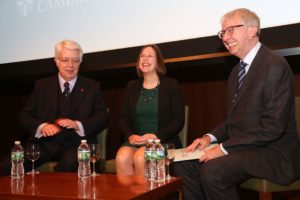
But the importance and seriousness of the topic didn’t prevent us from having a good laugh on occasion as well, as is clear from the photographic evidence!
Cambridge Festival of Ideas
The leaves are falling, the nights are drawing in, but to cheer us all up it’s Cambridge Festival of Ideas time again. In the How To Read events, researchers from the Faculty of English share their approach to a text of their choice. I’m speaking on Monday 19th October on Lisa Cholodenko’s film High Art (1998), and there are events also on 22nd and 26th October.
Web We Want Festival at the Southbank Centre
Taking place at the Southbank Centre in London over the weekend of Saturday 30th and Sunday 31st May, the Web We Want festival dives into the wonderful world of the web with a packed weekend of technology, digital art, talks, exhibitions and creative workshops. I’ll be there on the Saturday chairing a panel on ‘When Science Fiction Becomes Reality: AI in the Digital Age‘. Organised by the ANXS Collective, who specialise in public engagement in Art and Science, the panel features scientist Professor Murray Shanahan, Professor of Cognitive Robotics in the Department of Computing at Imperial College London and recently scientific advisor to the film Ex_Machina, alongside artist and fellow SF-lover Richard Adams, and filmmaker Khalil Sullins. Khalil’s debut feature film, the sci-fi thriller Listening, was released in 2014 and has its international premiere at the Sci-Fi-London Film Festival after our Web We Want Panel – so why not make a weekend of it!
Reading the Anthropocene
My next event on the Cambridge Festival of Ideas calendar is ‘Reading the Anthropocene‘ which takes place on Thursday 30th November in the Faculty of English. Again thanks to the wide-ranging interests of my PhD students, I was alerted to this term a few years back and have been following debates around it ever since. I’m delighted that joining me to talk about whether we are indeed now in a new geological era, and whether or not that actually matters, will be Philip Gibbard, Professor of Quaternary Palaeoenvironments in the Department of Geography here at Cambridge, and writer and environmental campaigner Tony Juniper. It promises to be a lively discussion that could not be better timed as the International Commission on Stratigraphy’s Working Group on the ‘Anthropocene’ meet for the first time this week to assess the evidence of man’s impact on the planet.
Cambridge Festival of Ideas
The Cambridge Festival of Ideas began this week and runs until Sunday 2nd November. It’s a great event that each year prompts academics to think of interesting and engaging ways to share their ideas with the public. I had the pleasure yesterday evening of taking part in one of the Faculty of English’s How to Read sessions. Two of our graduate students gave fantastic talks, one on Hilary Mantel’s French Revolution epic A Place of Greater Safety (1992) and the other on Masuji Ibuse’s 1965 novel about the devastation caused by the Hiroshima atomic bombing, Black Rain. Having triumphantly just submitted the manuscript of my edited collection (along with co-editor Dr Caroline Edwards at Birkbeck) on Maggie Gee, I was delighted to have the opportunity to talk about her work in public, focusing on the short story collection The Blue (2006). The audience were fantastic and post-presentation discussion ranged from the benefits or not of ereaders to the universality of themes across literature. I even got to talk a little about one of my favourite words and things, something a wonderful PhD student taught me about many years ago – skeuomorphism. Check out the full guide to the festival here.
Cambridge Film Festival 2014
Tomorrow sees the start of the 34th Cambridge Film Festival, which is bringing me out of summer academic hibernation with a bang. It’s been running since 1977 with a brief break in the late 1990s which happened to fall over my undergraduate years at Cambridge, so it’s great to finally be able to experience the festival now, as both a film-goer and as a reviewer and Q&A host. Cambridge 105fm’s Bums on Seats will be hosting two radio specials this Saturday and next, where I’ll join Toby Miller and others to review some of the highlights of the festival. Take One magazine will be providing exclusive written coverage of the festival. My first review for them is of a film that was released in the same year the festival launched – The Glitterball is a self-deprecatingly comic children’s science fiction/Enid Blyton hybrid. For more reviews from me, and the other writers covering the festival, keep an eye on the Take One website. I’ll be posting my thoughts on a host of films from Woody Allen’s latest, Magic in the Moonlight, part of the opening night extravaganza, to the much more hard-hitting André Sanger’s Night Will Fall, taking in many others in between. I’ll also be hosting a Q&A with André Sanger and producer Sally Angel after the 6pm showing of Night Will Fall on Tuesday 2nd September. And the preceding evening I’ll be hosting a Q&A with Rowan Joffe (writer of the screenplay for 28 Weeks Later) and Stephen J Watson after the 9pm screening of Before I Go to Sleep – a film which stars Nicole Kidman and Colin Firth in what I can’t help but think of as 50 First Dates turned to the dark side.
It’s going to be a fantastic ten days of unadulterated cinematic indulgence – tune in or turn up where you can!

